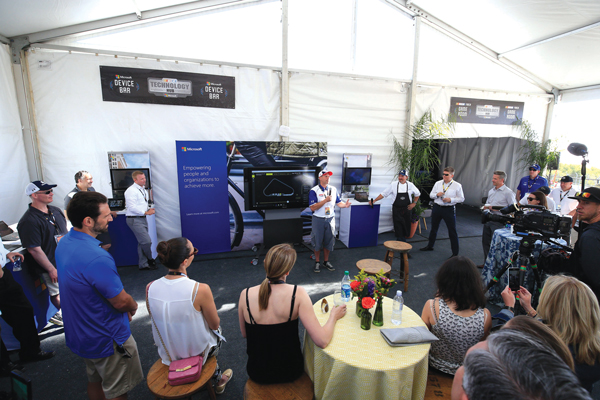Before it was spun off into Axalta, DuPont used to host massive hospitality gatherings at NASCAR races, at times bringing in hundreds of guests per event. But amid the corporate belt-tightening of the Great Recession, the coatings company decided it was time to cut back.
“When you’re hosting hundreds of folks, those things can get out of hand quickly, where — looking at it from our perspective — one of your guests could be the neighbor of a cousin of a body shop person,” said William Sturgill, North American motorsports director for Axalta, which says it sees a 3:1 return on investment in NASCAR. “Taking care of that guy is a nice thing to do, I guess, but does it help us accomplish our goals in the end? Probably not.”
Axalta is one of many companies causing a shift in motorsports, which is moving to more nimble, customizable hospitality options to keep up with shifting demand. No longer are giant tent chalets the norm.
Mike Burch, senior vice president of national sales and marketing of Speedway Motorsports Inc., which owns eight
 |
NASCAR hosted an event for partner Microsoft at Sonoma Raceway.
Photo by: NASCAR |
racetracks, said SMI has learned to adjust over time in order to keep pace with the desire of corporate partners.
“Five or 10 years ago, it might have been hosting 500 people in a tent,” Burch said. “You’re seeing a lot more variety [now]; it’s not a standard, one-size-fits-all hospitality solution.”
Racetracks are increasingly being asked not only to provide more tailored spaces but to plan out entire events for companies, which, in exchange for bringing fewer people, now want higher-end amenities — farm-to-table cuisine plus cushy furniture — and unique access that can get them close to the action on track or on pit road.
One example is from independently owned Indianapolis Motor Speedway, which before this year had only standard 80-person, $115,000 suites to offer. Heading into this year’s 100th running of the Indy 500, the track knocked down a bank of 18 suites near Turn 4 and converted the space into the Hulman Terrace Club. The 1,150-seat club cost $1,750 to attend the track’s two IndyCar and one NASCAR weekends this year.
“What we’re seeing is a lot of interest in hospitality, but in a completely nontraditional way,” said Doug Boles, president of IMS. “We found during the [Indy] 500 that we had a lot of interest around the Hulman Terrace Club hospitality because it was individual, customizable, and smaller groups of friends could go and build an experience around it.”
Another example comes from Gateway Motorsports Park, an independent track located near St. Louis that has tried to lure former hospitality customers of the NFL’s St. Louis Rams given the Rams’ relocation to Los Angeles. Chris Blair, Gateway’s executive vice president and general manager, noted that the track has added more luxury amenities to try to land the companies, because those companies have come to expect such opulence at NFL venues.
“It’s because of all the new modern arenas that have popped up the last few years where the experience is just unbelievable; that’s where everybody raised the bar,” Blair said. “It’s so competitive right now to try to get those hospitality dollars. We’re going after a lot of people who spent money with the St. Louis Rams, and in order to do that, we’ve got to make sure that we’re offering something that’s on par with that or exceeds those expectations.”
Hospitality inventory at Gateway includes a new pit-side chalet package for IndyCar’s return there next year that sells for $37,500 and features an elevated viewing area on pit road for 20 people. The package comes with tickets for the race, pit passes, parking and driver appearances, but does not include food and beverage.
Even properties are getting in on the action. NASCAR, for example, hosted an all-inclusive hospitality offering for partner Microsoft earlier this year at scenic Sonoma Raceway.
“We’re definitely seeing more requests, which is a restaurant trend as well. People want that farm-to-table sort of atmosphere,” said Michael Printup, president of Watkins Glen International and president of Americrown, which provides catering and concessions for 11 of 12 International Speedway Corp. tracks. “When we go to Kansas [Speedway, for example], they want some indigenous things, and I mean right from the farm. People are saying, ‘We like the farm-to-table concept; what can you do for us?’”




